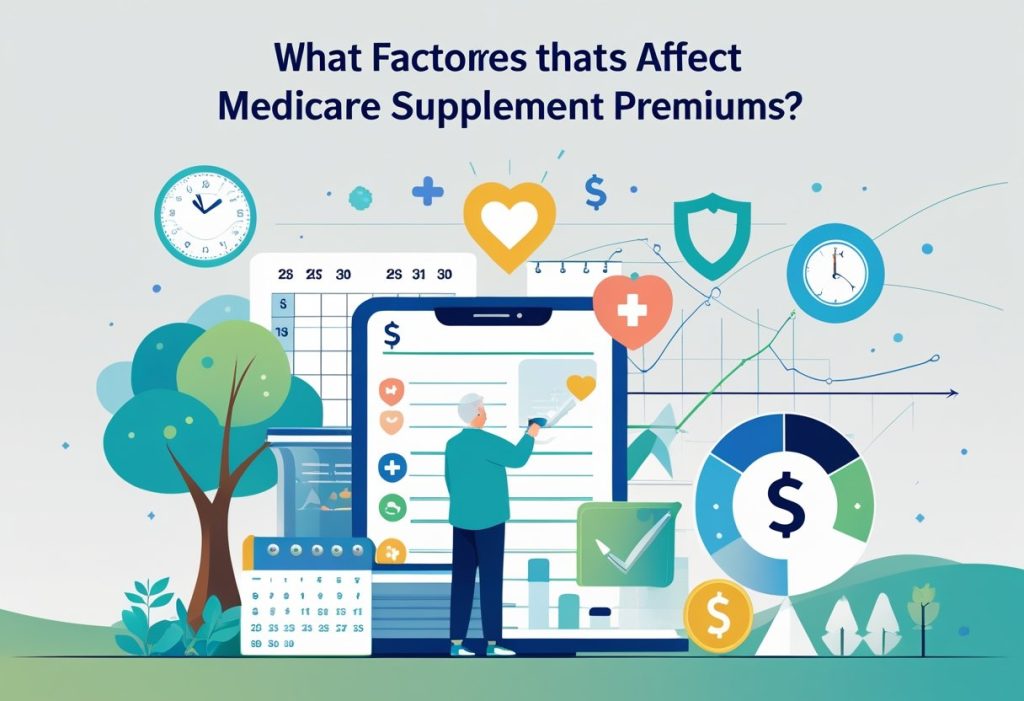Understanding what influences Medicare supplement premiums is crucial for managing your healthcare costs effectively. Several factors, including your age, location, tobacco use, and how your premiums are structured, significantly impact the rates you’ll pay. As you navigate the complexities of Medicare and Medigap plans, being aware of these elements can empower you to make informed decisions.
At The Modern Medicare Agency, our licensed agents are dedicated to helping you find plans that suit your unique needs without hidden fees. They provide personalized support, ensuring you receive the best coverage options available. By understanding how these factors affect your premiums, you can engage more effectively with your Medicare decisions and optimize your healthcare budget.
Investing time in understanding these aspects will lead you to better choices for your Medicare supplement coverage. The right guidance can help mitigate unnecessary costs and enhance your healthcare experience.
Core Factors That Determine Medicare Supplement Premiums
When considering Medicare supplement premiums, several core factors come into play. Understanding these elements can help you make informed decisions regarding your Medigap plan and overall healthcare costs.
Age and Enrollment Timing
Your age significantly impacts Medigap premiums. Insurers typically base your rates on your current age, meaning premiums tend to increase as you grow older.
Early enrollment is crucial; if you sign up during your initial enrollment period, you may secure lower rates and avoid medical underwriting. For instance, enrolling as soon as you turn 65 allows you to take advantage of guaranteed issue rights, where you cannot be denied coverage.
Failure to enroll when first eligible can result in higher premiums or even denial of coverage later. Therefore, timing your enrollment is essential to control your costs effectively.
Plan Type and Level of Coverage
Not all Medicare supplement plans are the same. Plans like Plan G, Plan N, and Plan F differ in coverage levels, and this variation directly affects premiums.
For example, Plan F offers comprehensive coverage, thus generally higher premiums compared to Plan N, which has lower monthly costs but higher out-of-pocket expenses for certain services.
Understand the benefits of each plan and match them with your health needs. By evaluating how frequently you utilize healthcare services, you can choose a plan that offers the right balance between premium costs and coverage.
Location and State Regulations
Your geographical location plays a vital role in determining Medicare supplement costs. Premiums can vary significantly based on your state due to differing regulations and healthcare market dynamics.
Some states have unique rules that influence Medigap premiums, potentially resulting in lower costs. Community-rated plans, for example, charge the same premium regardless of age, while issue-age rated plans consider your age at enrollment.
Understanding these regional variations can help you find better Medicare supplement options. The Modern Medicare Agency’s licensed agents are available to guide you through these complexities, ensuring you find the right package tailored to your needs without any surprise fees.
How Insurance Company Pricing Methods Affect Rates
The way insurance companies price Medicare Supplement premiums can significantly impact your overall costs. Understanding different pricing methods is essential for selecting the right plan that suits your financial situation.
Community-Rated Plans Explained
Community-rated plans charge the same premium to all policyholders, regardless of age. This pricing structure promotes equity among enrollees, meaning that you won’t pay higher premiums simply because you are older.
Key Features:
- Consistent rates across ages.
- Limits premium fluctuations for older individuals.
However, you may experience Medigap premium increases due to factors like inflation or rising healthcare costs. Community-rated Medigap plans can be a financially sound choice, especially if you’re concerned about future price hikes related to your age.
Issue-Age-Rated vs. Attained-Age-Rated Factors
Two common pricing methods are issue-age-rated and attained-age-rated plans.
- Issue-Age-Rated Plans: Your premium is determined by your age at the time of enrollment. Premiums remain lower for younger individuals, but can increase as you age, though the rate grows more slowly than other methods.
- Attained-Age-Rated Plans: With this method, your premium is based on your current age and typically increases as you get older. Initially, the costs may seem attractive for younger buyers, but they can become quite expensive over time.
Choosing the right pricing method involves weighing long-term sustainability against immediate affordability. At The Modern Medicare Agency, our licensed agents can help you navigate these options, ensuring you find a plan that suits your needs without extra fees that break the bank.
Personal and Lifestyle Impacts on Your Premiums
Your personal habits and lifestyle choices significantly influence your Medicare supplement premiums. Factors such as tobacco use and the options you choose for payments can impact the overall cost of your Medigap plan.
Tobacco Use and Health Status
Tobacco use directly affects your Medicare supplement premiums. Many insurers categorize users as higher risk, resulting in increased rates. Smokers may pay up to 15-30% more than non-smokers.
Additionally, your overall health status can play a crucial role. Pre-existing conditions might lead to higher premiums or limited coverage options. Insurers commonly assess your medical history and current health to calculate rates.
A comprehensive Medigap quote provides insights into how these factors affect your specific situation. Being tobacco-free or maintaining good health can help you secure better rates, making it essential to consider these aspects when shopping for supplements.
Household Discounts and Payment Options
Many insurance providers offer household discounts to lower premiums. If you and another individual residing in the same household enroll in the same Medigap plan, you could obtain a discount, which may lead to significant savings.
Moreover, understanding your payment options is crucial. Some insurers allow monthly, quarterly, or annual payments, varying the overall cost. Opting for an annual payment might save you money in the long run, while monthly plans offer flexibility.
Choosing to work with The Modern Medicare Agency can help you navigate these options effectively. Our licensed agents provide personalized assistance, ensuring you find plans that fit your needs without incurring extra fees that strain your budget.
Premium Changes and Rate Increase Drivers Over Time
Several factors contribute to changes in Medicare supplement premiums. Understanding these elements can help you navigate future costs and make informed decisions about your coverage.
Medical Inflation and Rising Healthcare Costs
Medical inflation continues to rise, driving up the costs of healthcare services. According to recent reports, healthcare costs have been growing at a rate exceeding the general inflation rate. This rise directly impacts your Medigap premiums as insurers adjust rates to reflect increased provider expenses.
- Labor Costs: Higher salaries for healthcare professionals contribute to premium inflation.
- Technology Advancements: New medical technologies often come with premium price tags.
Insurers assess these trends when determining premium rates. As costs increase, you may see adjustments in your Medigap policy. Staying informed can help you anticipate these changes.
Change in Risk Pools and Rate Histories
The composition of risk pools significantly influences premium pricing. A shift toward an older and sicker population results in higher overall claims, prompting insurers to raise premiums.
- Demographic Shifts: An aging population increases the number of individuals requiring medical care.
- Claims History: If your insurer experiences higher-than-expected claims, this may translate into increased premiums in the following years.
Monitoring the Medicare supplement rate comparison report can provide insights into these trends. The Modern Medicare Agency offers personalized assistance to help you navigate these changes without unnecessary costs. Our licensed agents work with you one-on-one to identify the most suitable Medicare packages tailored to your needs.
Comparing and Managing Medicare Supplement Premiums
Understanding how to effectively compare and manage Medicare supplement premiums is essential for maximizing your healthcare budget. By utilizing the right tools and strategies, you can find better rates and ensure that your coverage meets your needs without overspending.
How to Compare Medigap Rates
Comparing Medigap rates involves evaluating various factors that influence premiums. Start by gathering quotes from multiple providers. Focus on these aspects:
- Plan Coverage: Different plans offer varying levels of coverage. Ensure you compare similar plans for an accurate comparison.
- Rating Methodology: Insurers use different rating methods that can affect your premium costs. Familiarize yourself with community-rated, issue-age-rated, and attained-age-rated plans.
- Annual Increases: Look into historical rate increases for each insurer. Some companies have more stable premium trends.
Utilize a Medicare supplement rate comparison report to assist in your analysis. The Modern Medicare Agency can provide a tailored report to help you identify the best options based on your specific needs.
Switching Plans and Using Rate Comparison Tools
Switching plans can lead to significant savings, but make sure to understand the implications. Here are key points to consider:
- Timing: The best time to switch is during open enrollment, when you have guaranteed acceptance regardless of health status.
- Health Underwriting: If you switch outside of open enrollment, you may face medical underwriting, which could affect your eligibility and premiums.
- Rate Comparison Tools: Utilize online tools to compare premiums from various insurers instantly. Look for user-friendly platforms that provide clear information about each plan.
Working with The Modern Medicare Agency gives you access to licensed agents who can guide you through this process. They focus on identifying Medicare packages that fit your requirements without hidden fees. This personalized service ensures you make informed decisions about your Medicare options.
Frequently Asked Questions
Understanding Medicare supplement premiums can be complex. The sections below address common questions regarding how these premiums are calculated, the income factors involved, and the variability in rate increases across different providers.
How are Medicare supplement premiums calculated?
Medicare supplement premiums are typically calculated based on several factors. These include your age, location, and the specific plan you choose.
Insurance companies may also assess your health history. This evaluation can impact your premium rates, with some companies offering lower rates to healthier individuals.
What income is used to determine Medicare premiums?
Generally, the income used to determine Medicare premiums is based on your reported income from the previous tax year. This includes your adjusted gross income and any additional taxable income.
The Social Security Administration uses this income information to establish your premium amounts for Medicare Part B and Part D coverage.
How do rate increases for Medicare supplement plans tend to vary between providers?
Rate increases can differ significantly between insurance providers. Some companies might raise their rates annually, while others might do so less frequently.
It’s important to compare various providers to understand their specific practices regarding premium increases.
What are the most significant factors that impact the cost of a Medicare supplement plan?
Key factors affecting the cost of a Medicare supplement plan include your age, gender, location, and tobacco usage. Additionally, the benefits included within the plan can influence the overall cost.
Insurance companies may also employ different pricing strategies, such as community-rated, issue-age-rated, or attained-age-rated models.
How does one’s personal income affect their Medicare supplement premiums?
Your personal income can indirectly affect your Medicare supplement premiums through your eligibility for financial assistance programs. Higher income levels may result in higher premiums for Medicare Part B.
However, whether your personal income directly influences Medigap premiums can vary depending on the insurer’s pricing model.
Are there any historical trends in Medicare supplement premium rate increases?
Historical trends show that Medicare supplement premiums have generally risen over time. This increase can be attributed to factors such as healthcare inflation and rising claims costs.
Staying informed about these trends can help you anticipate potential future rate changes.
For expert guidance on Medicare plans tailored to your needs, consider reaching out to The Modern Medicare Agency. Our licensed agents are available to assist you one-on-one, ensuring you find a plan that aligns with your requirements without incurring extra costs.






